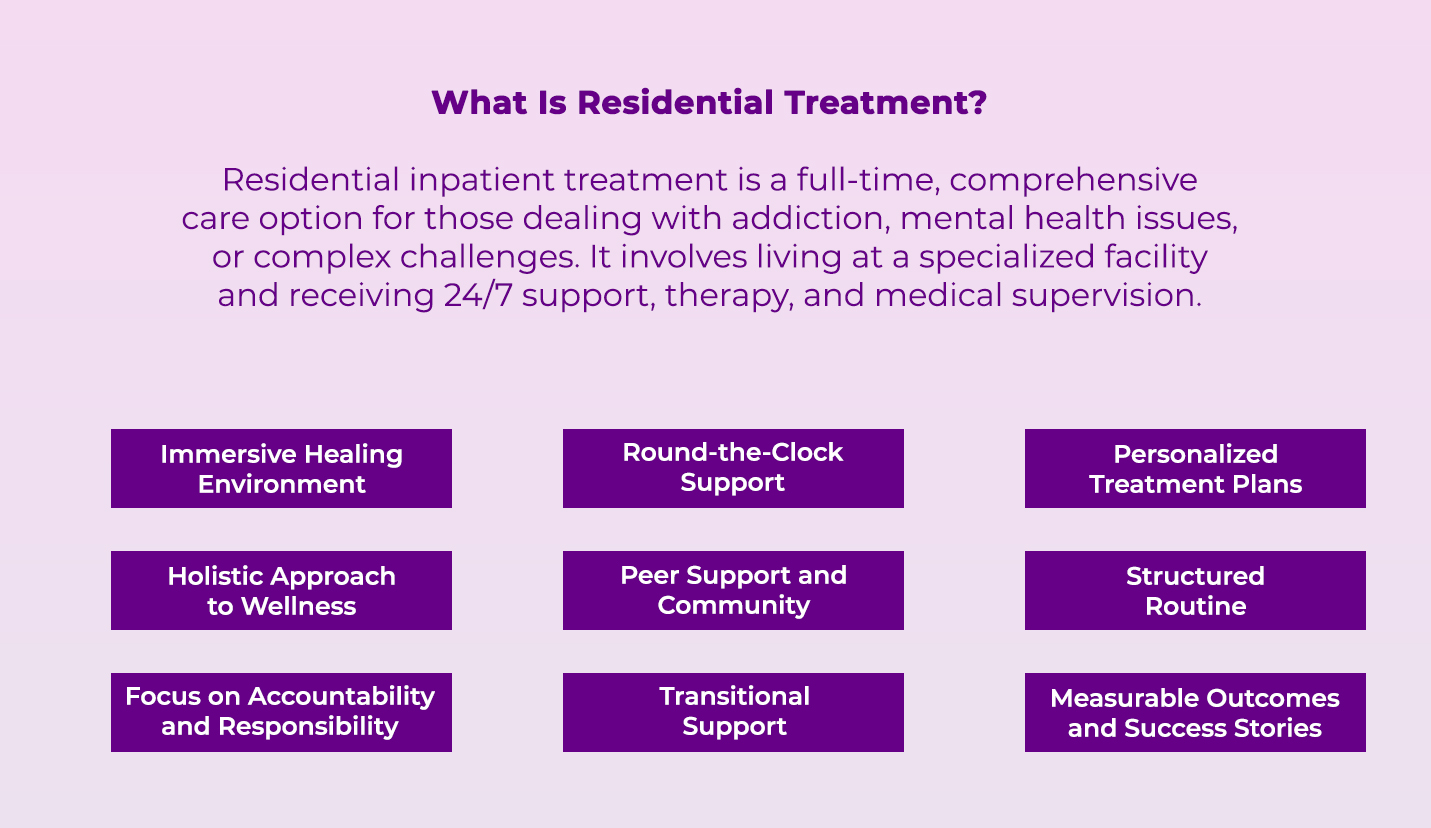Residential inpatient treatment stands as a beacon of hope for individuals grappling with various forms of addiction, mental health disorders, and behavioral challenges. Through a holistic approach to healing and recovery, these programs offer a lifeline to those in need.
Let’s delve into the effectiveness of residential inpatient treatment and how it transforms lives.
What Is Residential Treatment?
Residential inpatient treatment is a comprehensive form of care for individuals struggling with addiction, mental health disorders, or other complex challenges. In this type of treatment, individuals reside full-time at a specialized facility, receiving round-the-clock support, therapy, and medical supervision.
The primary goal of residential inpatient treatment is to provide a safe and structured environment conducive to healing and recovery. Through a combination of evidence-based therapies, personalized treatment plans, and holistic approaches, residential inpatient treatment addresses the underlying issues contributing to a person’s struggles and equips them with the tools and strategies needed to achieve and maintain sobriety or manage their mental health effectively.
Why Should You Choose Residential Treatment?
Rehab in a residential setting can aid in your recovery. But that isn’t the only advantage; going to treatment is beneficial for more reasons than one. Patients can create healthy behaviors and address old residential therapy difficulties, offering the structure and community needed to start the healing process. You can develop coping mechanisms for stress and symptom management while removing yourself from toxic situations and triggers.
Residential treatment offers a variety of different therapies:
- Cognitive Behavioral Therapy
- Dialectical Behavioral Therapy
- Medication Treatment
- Support Groups
- Management Of Medication
- Individual and Group Therapy
Who Needs Residential Treatment?
Residential treatment is a beacon of hope for individuals facing complex challenges related to substance abuse or mental health disorders.
Individuals with Severe Addiction:
For those grappling with severe substance abuse disorders, residential treatment provides a structured and supportive environment essential for detoxification and rehabilitation. With round-the-clock care and supervision, individuals can safely navigate the complexities of withdrawal and embark on a path toward sobriety.
Individuals with Co-Occurring Disorders:
Many individuals struggle with both substance abuse and mental health issues, known as co-occurring disorders. Residential treatment facilities specialize in addressing these dual diagnoses, offering integrated treatment approaches simultaneously targeting both conditions.
Individuals at Risk of Relapse:
For individuals who have experienced multiple relapses or struggle to maintain sobriety in outpatient settings, residential treatment offers a higher level of care and accountability. By immersing individuals in a therapeutic environment free from triggers and temptations, residential treatment minimizes the risk of relapse and fosters lasting recovery.
Individuals in Need of Intensive Support:
Some individuals require intensive support and intervention to address underlying trauma, co-dependency issues, or dysfunctional behavioral patterns. Residential treatment provides the resources and expertise to delve deep into these underlying issues and facilitate profound healing and personal growth.
Individuals Seeking a Fresh Start:
Residential treatment also benefits individuals seeking a fresh start, away from negative influences and environments perpetuating destructive behaviors. By immersing themselves in a supportive community dedicated to wellness and recovery, individuals can lay the groundwork for a brighter, healthier future.
What are Some Benefits of Residential Treatment?
Residential treatment offers a comprehensive approach to addressing various challenges individuals face, providing a structured environment conducive to healing and growth. Here’s a breakdown of the key benefits associated with residential treatment


Immersive Healing Environment:
Residential facilities offer a structured environment conducive to recovery. Daily routines, therapy sessions, and recreational activities are carefully curated to promote healthy habits and positive coping mechanisms. By immersing individuals in a supportive community, residential treatment instills the skills needed for long-term success.
Round-the-Clock Support:
One of the defining features of residential inpatient treatment is the round-the-clock support and supervision. Trained professionals are always available to provide assistance, monitor progress, and intervene when necessary. This constant presence fosters a sense of security and stability essential for effective rehabilitation.
Personalized Treatment Plans:
Each individual’s journey is unique, and residential treatment recognizes this by offering personalized treatment plans tailored to specific needs and circumstances. This customized approach maximizes the effectiveness of the interventions.
Holistic Approach to Wellness:
Residential treatment emphasizes a holistic approach to wellness, addressing the symptoms and underlying factors contributing to the issue. This comprehensive method promotes long-term recovery and overall well-being.
Peer Support and Community:
Being part of a community of individuals on similar paths fosters a sense of belonging and camaraderie. Peer support is crucial in residential treatment, offering encouragement, empathy, and shared experiences.
Structured Routine:
Structure and routine provide stability and predictability, essential elements in the recovery process. Residential treatment programs typically incorporate structured daily schedules, including therapy sessions, recreational activities, and downtime for reflection.
Also Read: Street Names For Alcohol
Focus on Accountability and Responsibility:
Residential treatment encourages individuals to own their actions and decisions, fostering accountability and responsibility. Through guided introspection and feedback, individuals learn to recognize behavior patterns and develop healthier coping mechanisms.
Transitional Support:
Transitioning back to daily life after residential treatment can be challenging. However, many programs offer transitional support and aftercare services to ease this process. This continuity of care enhances the likelihood of sustained success post-treatment.
Measurable Outcomes and Success Stories:
The effectiveness of residential inpatient treatment is evident in the measurable outcomes and success stories it generates. Whether it’s achieving sobriety, managing symptoms of mental illness, or rebuilding relationships, countless individuals have found hope and healing through these programs. Their stories serve as a testament to the transformative power of residential treatment.
Conclusion
Residential treatment serves as a beacon of hope for individuals seeking to reclaim their lives from the clutches of addiction or mental illness. Its holistic approach, intensive care, and supportive environment pave the way for profound healing and lasting recovery.
Embrace the journey towards a brighter, healthier future with residential inpatient treatment. On the QAN’s website, you can find 100+ partnered resident treatment centers in the US.
Contact our team at (888) 564-4780 or drop your query, and our team will contact you.
